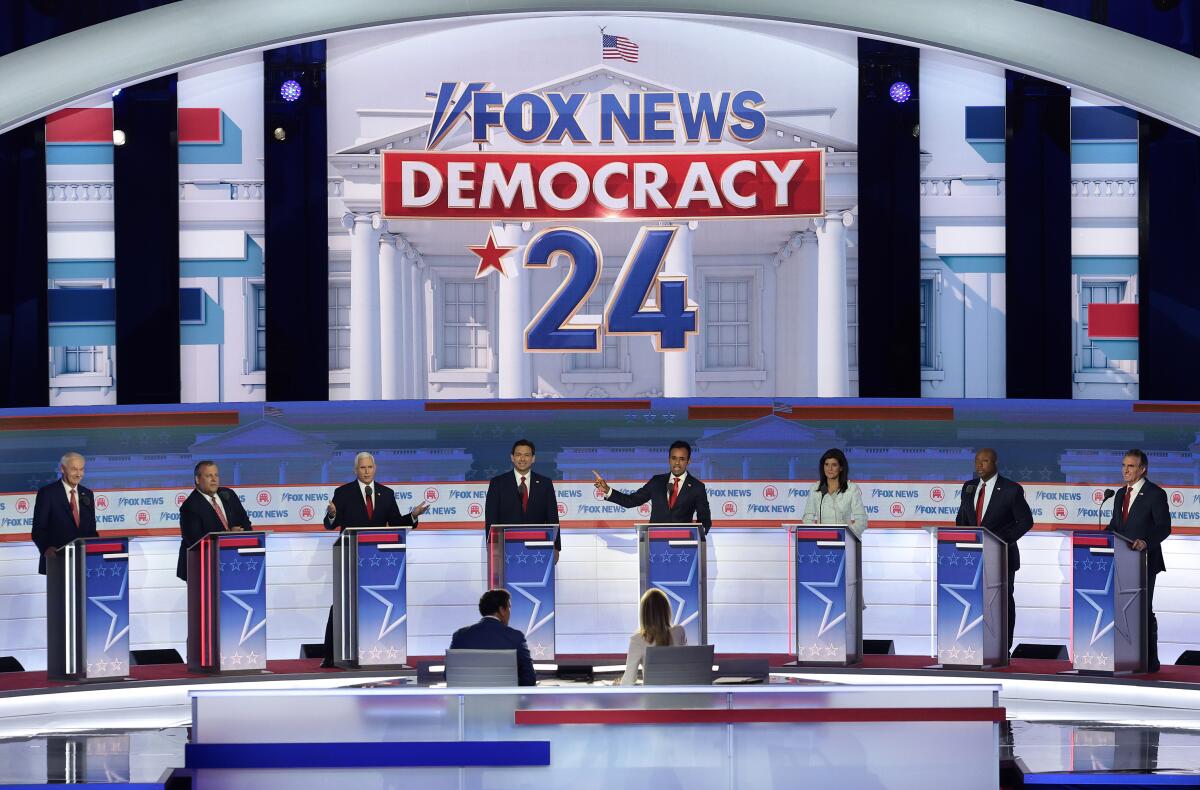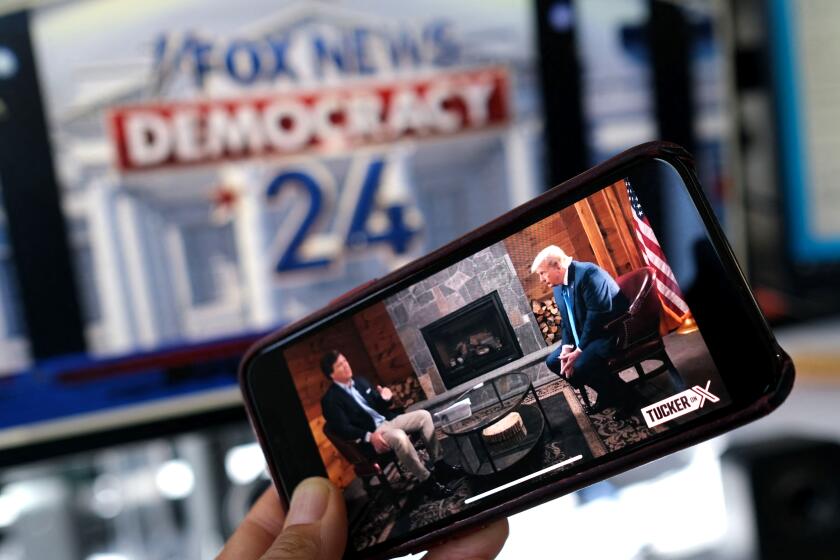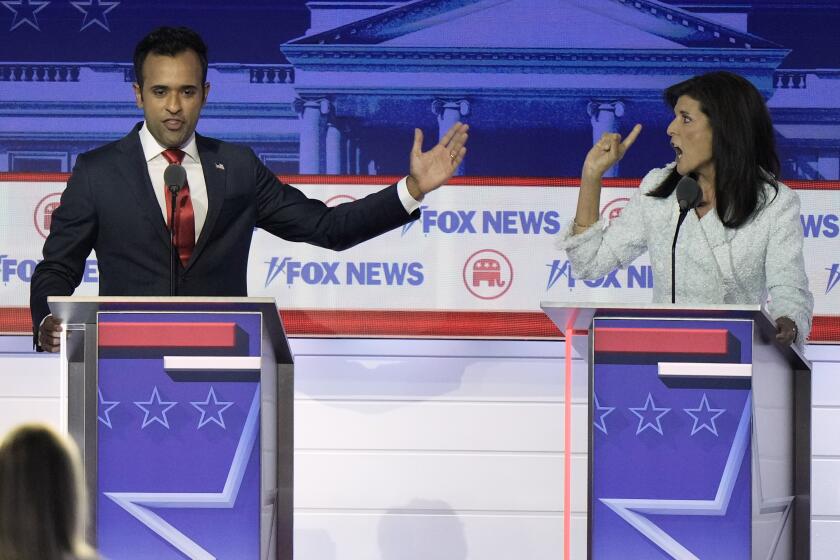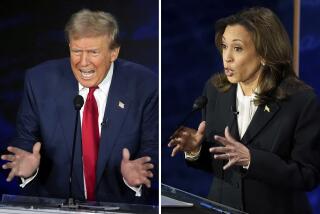Commentary: GOP debate made it clear that cutting humanities from universities is a danger to humankind

Bedazzled by the lucrative allures of STEM and the popularity of business degrees, universities have been defunding their humanities programs and transforming themselves into vocational training centers with five-star gyms. Foreign language departments are being eliminated at state universities and history, philosophy and English literature majors are on the chopping block everywhere.
The hue and cry over this benighted movement, in which institutions of higher learning are turning their backs on their fundamental mission, will likely not be enough to stop the forces operating under the cover of budgetary necessity. How can a nation intellectually and morally compete in the 21st century global world with a system of higher education that cares more about magazine rankings than the transmission of wisdom?
The first 2024 Republican presidential primary debate, held Wednesday night in Milwaukee, revealed the moral bankruptcy of an America that no longer values the kind of enlightenment fostered by a liberal arts education. The eight candidates duking it out to play second fiddle to Donald Trump, who skipped the event to pack for his trip to the Fulton County Jail in Atlanta on Thursday and to gloat about his front-runner status, were oblivious to the ironies surrounding them.
Former President Trump chose to skip the first Republican primary debate in favor of an interview with Tucker Carlson, but it failed to overshadow the debate.
Allergic to complexity, they pandered to the partisan lusts of the Republican primary electorate. Incapable of seeing themselves — never mind the world — literally burning around them, these anxious Republican hopefuls adopted ideological positions they couldn’t always muster sufficient belief in, performing roles for an audience they feared but were determined, nonetheless, to master.
Asked to raise a hand if they believed that human behavior was causing climate change, they shriveled up onstage, as though they had been told to remove their clothes before the Fox News viewing public. Florida Gov. Ron DeSantis defied moderator Martha MacCallum’s straightforward request on the grounds that they were “not schoolchildren.” He claimed to want to debate the issue but then proceeded to launch into an attack on President Biden’s handling of the deadly wildfire in Maui.
The best defense is offense for a politician who doesn’t want to divulge what he knows about life-or-death matters. As the leader of a state buffeted by hurricanes and endangered by rising seas, the governor knows that insurance companies are fleeing his state as a lost cause. But knowledge has become the true enemy of the people for a would-be demagogue clinging to Trump’s playbook.
Vivek Ramaswamy, the most animatedly pugilistic of the debaters, took the climate question to separate himself from the pack. He wasn’t at all chastened by the boos that erupted when he declared, “As the only person on the stage who isn’t bought and paid for ... the climate change agenda is a hoax.” Quite the contrary. He was goaded to more shameless extremes, announcing that “more people are dying of bad climate change policies than they are of actual climate change.”
Perhaps Ramaswamy was equivocating with the audience, secretly recognizing that the failure to recognize the urgency of the crisis is behind the inadequate policies hastening our demise. But equivocation in a country that doesn’t care a whit if Shakespeare is still on the syllabus can easily pass unnoticed. And Ramaswamy, in any case, was careful to shore up his far-right bona fides, lest anyone mistake him for an establishment politician still thinly tethered to reality like former U.N. Ambassador Nikki Haley and South Carolina Sen. Tim Scott, neither of whom is living up to polling expectations.
What the audience will remember of the first Republican presidential debate is that there is no one ready to move on Trump.
The discussion around Trump’s raft of indictments was carefully contained, but the squirmy spectacle threw into relief what happens when leaders no longer have to worry about their place in history because history itself has been downgraded as a subject. Former Vice President Mike Pence justified the way he defied Trump’s pressure campaign to get him to put the president over the Constitution, but his fear of inciting MAGA fury led him basically to explain that God made him do it.
Former New Jersey Gov. ernor Chris Christie was outspoken on the issue of Trump’s fitness for office. “Someone has to stop normalizing this conduct, OK?” he asserted. But his appeal to reason fell on closed ears. Few in his party wanted anything to do with accountability for a cult hero who has made obstruction of justice a centerpiece of his 2024 platform. (Moderator Bret Baier had to scold the jeering audience for preventing Christie from even making his case.)
Vowing to pardon Trump before he’s even been convicted, Ramaswamy pounced on Christie’s vulnerable right flank. He charged that Christie’s “claim that Donald Trump is motivated by vengeance and grievance would be a lot more credible” if his own campaign “were not based on vengeance and grievance against one man.” How can anything but dogma survive in such a forum? Whether the topic was climate change, abortion, aid to Ukraine or Trump’s determination to destroy American democracy, the point wasn’t to shed light on a complicated public matter but to wield darkness for the sake of political expediency.
Hypocrisy in a primary debate is nothing new, but its flagrancy has reached a calamitous level. How has character come to mean so little in American society? What has gone wrong in our collective education that liars who don’t even make a good faith effort to conceal their deceptions can command such an enduring hold on the populace?
Justice, Greek tragedy reminds us, requires a wide-angle view. The political actors onstage in Milwaukee wore their tragic flaws on their sleeves. The blind spots in their vision made Oedipus look like a seer, but it was a willful, manipulative blindness they were engaged in.
In a New York Review of Books essay on C.P. Taylor’s play “Good,” Jacqueline Rose — who co-directs the Birkbeck Institute for the Humanities in London — talks about “the power of fascism to pluck the strings of the unconscious.” I was remembering her phrase while watching Ramaswamy attempt to put the Republican primary audience under his spell.
Christie scored one of his best zingers of the night when he compared Ramaswamy to “a guy who sounds like ChatGPT.” But how will we recognize the dangers of artificial intelligence or the concomitant perils of fascism if we discard the humanities as inconvenient to power?
The first Republican debate of the season took place in a world where literature, history and philosophy have been set aside as irrelevant. Critical thought was banished, and the pursuit of truth was forced to yield to the confirmation of biases and the promulgation of doctrines.
Universities making decisions about what departments to cut should take the long view before they accelerate this degradation of our nation’s capacity to examine, never mind govern, itself.
More to Read
The biggest entertainment stories
Get our big stories about Hollywood, film, television, music, arts, culture and more right in your inbox as soon as they publish.
You may occasionally receive promotional content from the Los Angeles Times.













